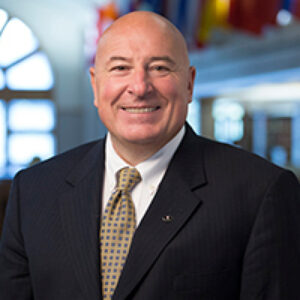In July, I joined hundreds of college and university business officers for the NACUBO 2023 Annual Meeting in Orlando, Fla. to discuss the state of higher education and solutions to overcome its many challenges. While the collective concerns of the attendees were palpable, their zest to think creatively, collaboratively, and nimbly, reverberated far more loudly.
Here are my top 3 takeaways from the NACUBO 2023 Annual Meeting:
No. 1 – Higher ed is facing major challenges that require creative solutions
While the enrollment cliff has been looming for years, the realities of those prognostications are already here and a path back to pre-pandemic enrollment levels feels further out of reach.
Changing demographics, the sunsetting of Higher Education Emergency Relief funds, and the dip in confidence in higher education, have business officers charting an uncertain path toward affordability, accessibility, and sustainability – all while not sacrificing their academic mission.
In a recent survey 65 percent of campus business officers, said they are confident in the 10-year outlook of their colleges. However, 19 percent said they lack confidence in the financial stability of their institutions over the next decade. Only 10 percent of campus chief executives answered that way in April 2023.
Faced with myriad challenges, colleges and universities are looking at every nook and cranny in search of ways to reimagine the delivery of higher education. Schools are breaking out of the siloed culture, and are looking holistically, creatively, and collaboratively, to rein in costs, maximize efficiencies and diversify revenue streams. One of the looming questions facing business officers is how to optimize the learning and on-campus living experience to attract and retain students in today’s increasingly competitive marketplace.
No. 2 – Colleges and universities are still hamstrung by IT shortages
IT departments in higher education are still reeling from the Great Resignation, when IT professionals left the industry in large numbers for higher-paying jobs in fully remote settings. With low unemployment levels in the U.S., and the nature of remote work, institutions both big and small face stiffer competition from higher-paying for-profit employers across the country.
According to a 2021 Apogee survey of 188 campus IT professionals, 50 percent said they are way understaffed and struggle to keep up, while 18 percent could use one or two more people. While smaller institutions are more likely to report frequent IT staff turnover, this is an issue for schools of all sizes, with 85 percent of respondents reporting some, frequent, or very frequent turnover. As a result, campuses are spending more time recruiting and retaining talent, and understaffed IT teams strain to keep up with Wi-Fi networks and other critically needed technology. Learn more about the IT staffing shortage challenges in higher ed in our e-book, Overcoming Campus IT Staffing and Expertise Gaps.
No. 3 – Managed technology services can serve as a lynchpin to meet challenges head-on
Some colleges and universities have partnered with Apogee to strengthen their competitive posture and meet IT staffing challenges head-on. Offloading Wi-Fi network operations to Apogee has led to not only exceptional network performance, but also an enhanced student experience and peace of mind for financially strained institutions through our predictable OPEX funding model. Muskingum University (New Concord, OH) and Washington College (Chestertown, MD) were two such schools searching for creative solutions to break the pandemic-enrollment cliff “doom loop.” Like many institutions, they faced growing technology challenges and suboptimal technology experiences, the need to align technology investments with institutional priorities, and the need to reset technology infrastructure to attract and meet the needs of underserved students, both on campus and remotely.
During the NACUBO education session “Break the Pandemic-Enrollment Cliff Doom Loop”, Philip Laube, Assistant to the President for Special Projects and Investments, Muskingum University, Edward Patrick, Vice President, Finance and Administration, Washington College, and Matt Loecke, Executive Vice President, Apogee, discussed transformational strategies and solutions to these challenges.
“You can’t cut your way to innovation,” said Laube.
“The challenge is communicating value,” Ed Patrick added, “Higher education is probably the most competitive industry in the U.S. right now. I approach the problem from the standpoint of ‘How do I improve student experience.’”
The impact of Apogee managed services has transformed each school’s financial worldview of deploying and managing technology on campus. It has vastly improved their lived student experiences in the classroom and in their residences. Apogee managed technology services have also empowered IT staff to realize their full potential, by tapping into their collective institutional knowledge and many years of service.
“Apogee provided us with the services we [Muskingum] were struggling with. The number one pain point for our students was network stability and reliability,” Laube said. “We analyzed carefully replacement costs versus the costs of managed services. We thought about our aging fiber infrastructure that was put in when campus was first wired and how Apogee managed services would enable us to modernize without a financial forklift. All of these benefits weighed into our decision-making. Going with Apogee was clearly the right choice.”
Arriving at the enrollment cliff does not mean you are doomed to go over the edge.
There is a way to bridge the chasm – through carefully aligning your technology investments with your institutional priorities, adopting contemporary financial models, and partnering with a trusted managed service provider like Apogee. These strategies will not only improve your financial outlook but will also enhance student experiences, empower staff to support positive outcomes, and create an IT organization that is sustainable and predictable, and more than capable of punching above its weight.





